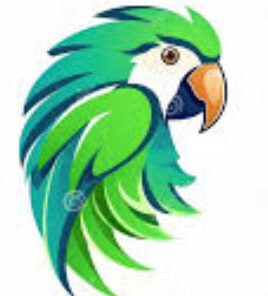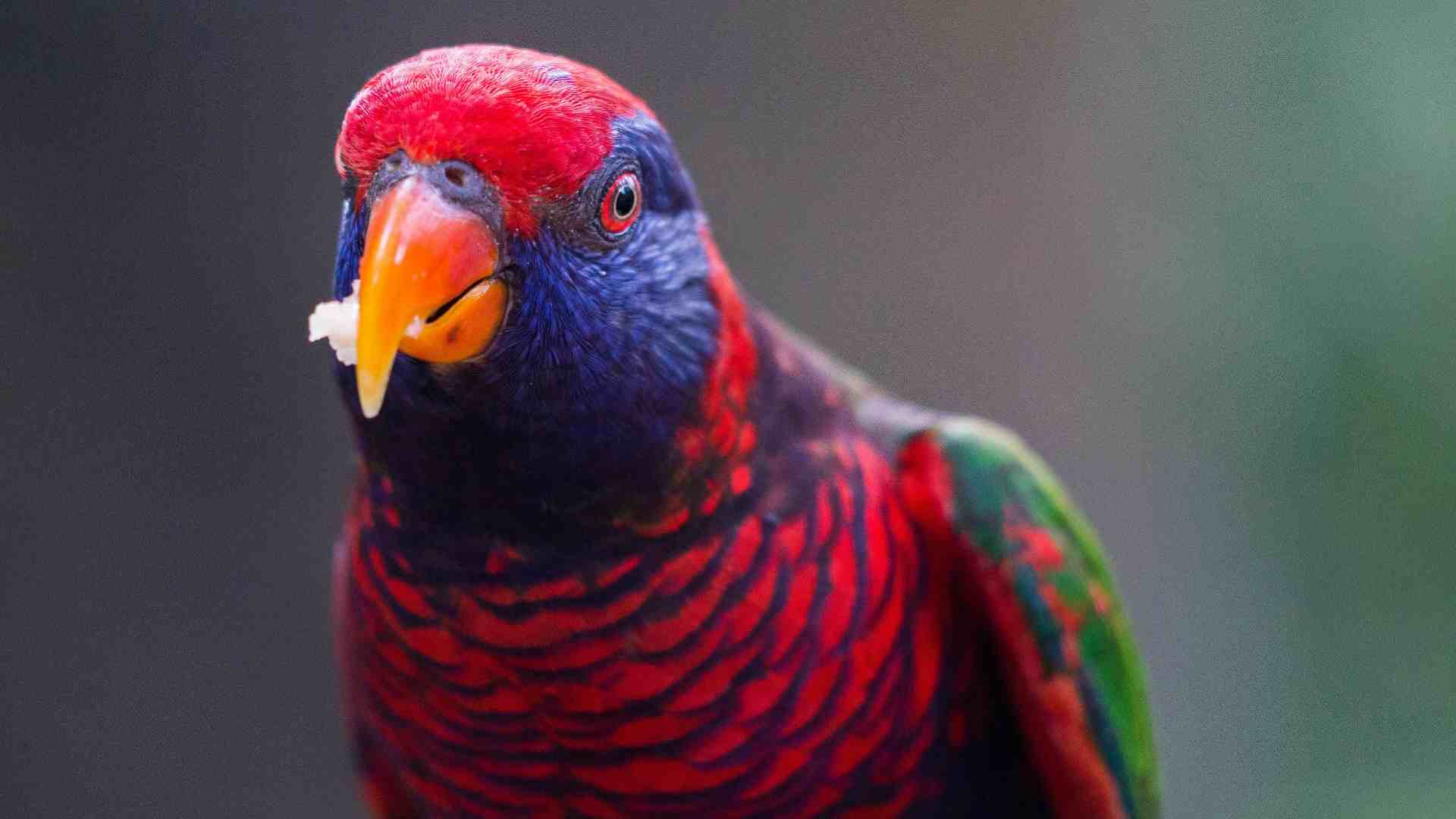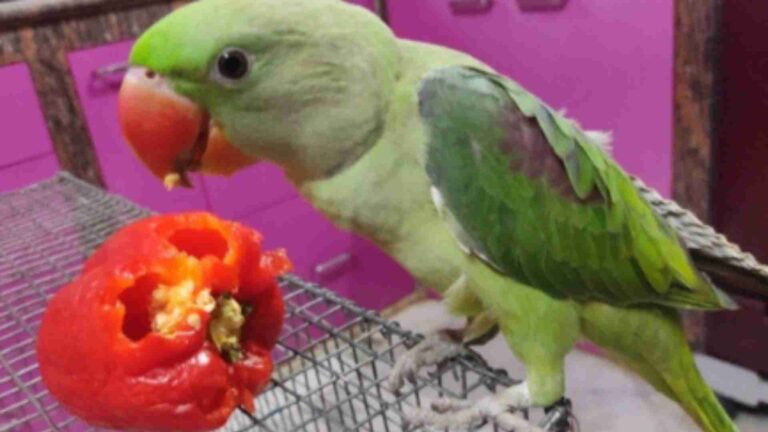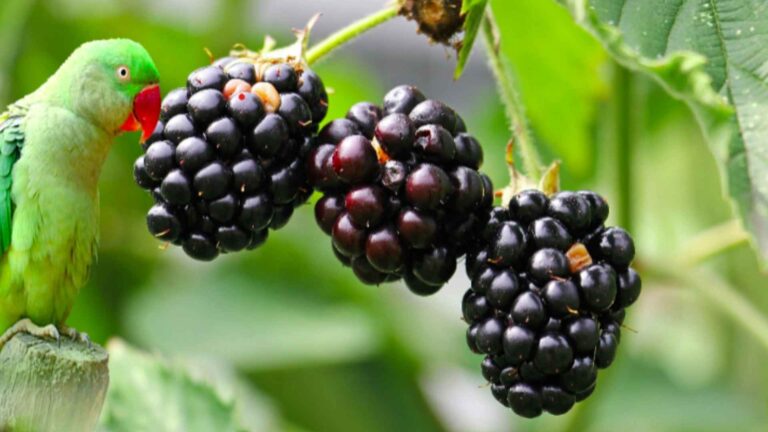Can Parrots Eat Cashews?
Every responsible pet parrot owner might be interested in the topic of which treats are suitable for the balanced diet of their parrot. The first popular one is Can Parrots Eat Cashews? Yes, parrots can eat cashews, though they should be provided occasionally. As with most nuts, most cashews are nutritious in that they contain rich protein and healthy fats. Therefore, the knowledge of the nutritional worth of cashews as well as the qualities of raw and roasted cashews will go a long way to aid the proper nutrition of your parrot.
The Nutritional Value of Cashews for Parrots
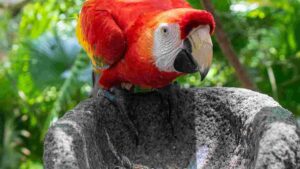
Many people like the cashew nuts, but besides being tasty, they also have nutritive values for the parrots. These nuts are a source of protein, and as you know, protein is important for the growth of muscles in your parrot.
Also, they are a source of vitamins and minerals; among the vitamins are magnesium, calcium, and phosphorus, which are essential for the health of the parrot. In the course of ensuring that your parrot receives the required nutrients, it is also important that you learn how cashews can be incorporated into the diet.
What are Cashews?
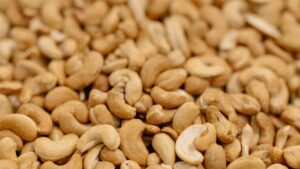
Cashews are nuts hailing from the deciduous tree known as Anacardium occidentale. These nuts are usually taken roasted or raw and have become a staple in many homes. To parrots, cashews are not a bad treat to offer them occasionally, given their tiny size, but they contain some fat.
Parrot owners need to be careful in the selection of the kind of cashews to feed the parrots because not all types of cashews are okay to feed the parrots, especially those that are salted or flavored.
Nutritional Profile of Cashews
The analysis of the nutritive value of cashews dictates that the nuts are understood to be high in fat but are, in fact, nutritious. These nuts have healthy unsaturated fats, which are good in moderation for parrots and avian diets and the health of their bones.
In addition, cashews contain dietary fiber, which plays a positive role in the digestion of food. However, it’s vital to note that due to their high-fat content, cashews should be fed sparingly to avoid potential obesity or fatty liver disease in parrots.
Benefits of Feeding Cashews to Parrots
Feeding cashews to your parrot is very useful, as a complementary diet can be added to the basic one. Cashews are useful in supplying some vitamins and micro-elements, which are often not present in other types of provisions for parrots.
Also, cashews are not toxic to parrots, and many species love nuts, so they can be incorporated into your parrot’s diet to make it more enjoyable. But as much as this seems to be the case, it is advisable to seek advice from a professional veterinarian on the right amount of cashews that should be fed to the parrot to maintain the parrot’s health.
Raw vs. Roasted Cashews:
Understanding Raw Cashews
Natural cashews are uncooked and are not processed with oil or heat; they are whole and packed with nutrients that can be safe to feed your parrot. These nuts are not only the best source of protein but also contain vitamins and minerals like magnesium, calcium, and phosphorus.
If there is a plan for feeding your parrot raw cashews, it is important to make sure that they are raw and sally-free. It is common knowledge that many parrot owners experience that the parrot loves the taste and chewy texture of the raw cashew nut, and this is recommended to be posted occasionally.
The Roasting Process and Its Impact
Cashews are first removed from their shells and roasted, and this process dramatically changes their nutrient composition. Roasted cashews make the flavor and crunch better but mostly contain more fats because of the cooking process.
Some researchers have identified that most of the vitamin and mineral content of cashews is reduced when the product is roasted. Also, roasted cashews often have a seasoning of salt or some other substances that are potentially toxic to parrots.
Hence the role of demarcation between raw and roasted seeds and nuts in a bid to determine which is most desirable for the consumption needs of parrots.
Comparing Nutritional Benefits: Raw vs. Roast
At this point, let me just explain that the nutritional value between the raw and roasted cashews could be way different. Raw cashews are packed with essential nutrients that are crucial to your parrot’s well-being, whereas roasted cashews have little of such nutrients. For example, uncooked cashews contain better tiers of healthy fat, proteins, and fiber that sell a balanced weight-reduction plan.
In contrast, the roasting method can diminish some of those useful vitamins. Therefore, at the same time as both types can be enjoyed as part of an occasional deal, raw cashews are generally preferred for their advanced nutritional profile in helping avian fitness.
How Many Cashews Can Parrots Eat?
It is therefore difficult to give the number of cashew parrots to feed them since it will depend on the size of the parrots, the species, and the health status of the parrot. In general, cashews should be given as an occasional snack given the fact that they contain a lot of fat.
A few raw cashews once or twice a week make a perfect addition to a parrot diet, but always observe your parrot’s response and get advice from a professional. Feeding parrots an excess of cashews can cause parrot obesity or fatty liver disease, the last of which is fatal for small parrot breeds. The parrot should therefore have these nuts in moderation because they are very nutritiously rich in proteins.
Feeding Schedule and Portion Control
You must set a feeding regimen for your parrot so that it is well-fed at all times. It is safe to feed your parrot cashew nuts as one of the seeds to be mixed with some fruits and vegetables. It means that if you feed your parrot cashews on rare occasions, you and your parrot will benefit from this product without adding excessive fats to your parrot’s diet.
Moderation is the key; you can have a small handful of cashews or a few to avoid having more than needed. In this way, the normal and healthy ranges and the right balance to supply to the parrot will also be easily discerned with these weekly or daily checks.
Signs of Allergies or Sensitivities
However, care must be taken at first to monitor for allergies amongst your parrots, in case they are sensitive to cashews. Some of the signs are changes in behavior patterns, featherpicking, or even digestive upsets. Sometimes if there are poor reactions, such as vomiting or additional sickness after eating cashews, this means that these nuts are dangerous to the parrots.
It is advised that advice should be sought from a veterinarian about any issues of health. This way you can take precautions and make sure your parrot gets a good, healthy diet with no harmful reactions and problems.
The Risks of Salt for Parrots
Salts are very dangerous for parrots since their organism is incapable of handling large amounts of sodium chloride. Drinking salted cashews, or in fact any salted products, tends to cost the body water, affects the kidneys, and causes toxicity. Parrot proprietors have to be vigilant while choosing treats, ensuring they are unsalted and free from harmful seasonings.
A high-fat content coupled with salt can exacerbate health issues, particularly for small puppy parrots, which are at greater risk of obesity and fatty liver disease. Always prioritize your parrot’s fitness by heading off the salt in their food plan.
How to Prepare Cashews for Your Parrot
There are several steps to make cashews safe for your parrot and also healthy for them to consume. When buying them, it is always advisable that you get raw cashews that are not processed with salt or any other addition. You may decide to run water over them to wash out the surface dirt before you serve the dishes. These cashews could be used in the seed mix or together with fruits and vegetables to make a recommended portion.
Just remind yourself that sometimes a person should gain some weight, but getting fat from excessive consumption of cashews is not probable because they should be consumed just occasionally, in several days. As with many foods, it is recommended to seek advice from a veterinarian about how to safely feed cashews.
Your parrot’s nutritional requirements are also different from those of the grownup parrots; to avoid cases of choking, cashews must, therefore, be fed in small pieces and intermittently introduced into the diet of the growing parrots.
Alternatives For Parrot
If you are planning to give something else to your parrot then there are some fruits for parrots which are given below:
Can baby parrots eat cashews?
Yes, baby parrots can eat cashews, but this should only be done sparingly. These nuts contain beneficial fats and protein, and these foods should be important in their growth and development. But since growing parrots need different things in their diet from adult parrots, one needs to make sure that the cashews are taken in small portions, especially when crushed for the baby parrot, which may lead to choking.
Cashews should be raw or natural and preferably unsalted to eliminate the use of dangerous additives in preparation. Although cashews are a healthy food to consume, they should not be the only food consumed. It’s important to offer different types of foods as well as vegetables and fruits; it is also good to consult the veterinarian to offer your baby parrot the best diet he or she needs to grow healthy.
Conclusion
It is important to know what kind of preparation should be done in order not to harm the parrot when feeding it cashews. Cashews contain a lot of protein and healthy fats but should not be taken in large amounts due to their calorie content; raw cashews are recommended rather than processed types such as salted and flavored.
However, these can also be helpful when guidelines for feeding the parrot should be consulted with a veterinarian and the serving of new foods should be introduced slowly.
It is recommended that parrots should be offered a diet that has plenty of variation; this can mean fresh fruits and vegetables, seeds, and nuts that offer the parrot a well-balanced diet they need. Learning about these safe feeding practices will enhance your parrot’s growth and brightness as well as longevity.
